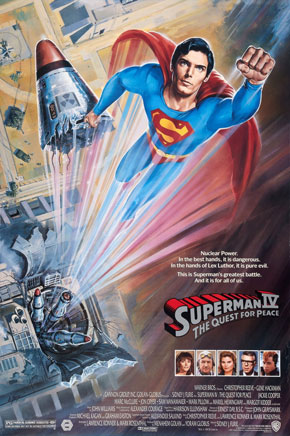
Baseball's Active Leaders, 2023
What Trump Said When About COVID
Recent Reviews
Everything Everywhere All at Once (2022)
Black Panther: Wakanda Forever (2022)
Doctor Strange in the Multiverse of Madness (2022)
Spider-Man: No Way Home (2021)
The Cagneys
A Midsummer Night's Dream (1935)
Something to Sing About (1937)
Angels with Dirty Faces (1938)
A Lion Is In the Streets (1953)
Man of a Thousand Faces (1957)
Never Steal Anything Small (1959)
Shake Hands With the Devil (1959)
Superman IV: The Quest for Peace (1987)
WARNING: SPOILERS
In “Superman: The Movie,” set in 1978, Superman (Christopher Reeve) brings a bit of old-fashioned conservatism (“I’m here to fight for truth, justice and the American way”) to a cynical, left-wing America presided over by Jimmy Carter. The result is charming.
In “Superman IV: The Quest for Peace,” set in 1987, Superman (same) brings a bit of left-wing idealism (“Effective immediately, I'm going to rid our planet of all nuclear weapons”) to a conservative, loutish America presided over by Ronald Reagan. The result is shit.
| Written by | Christopher Reeve Lawrence Konner Mark Rosenthal |
| Directed by | Sidney J. Furie |
| Starring | Christopher Reeve Gene Hackman Jackie Cooper Mariel Hemingway Margot Kidder |
Why? The fourth “Superman” movie, and the sad, last chapter in the Christopher Reeve series, reverts the old saying about failure being an orphan. This failure had nothing but fathers. Most of them deadbeats.
Bow down before Übermensch
Start with the concept, which started with Christopher Reeve.
In the DVD commentary to the Richard Donner cut of “Superman II,” creative consultant Tom Mankiewicz talks about Reeve coming to him with this idea about nuclear disarmament for “IV,” and while he loved Reeve, “the most wonderful guy in the world,” he says, “so altruistic in so many ways,” he says, he laid down the law:
I can tell you as a writer: Stay out of things that Superman can fix by himself … Don’t get into famine. Superman can feed the world. Just stay inside the character.
I’m reminded of that strip Jerry Siegel and Joe Schuster created for Look magazine in 1940, “How Superman would stop the war,” which was just two pages long. Superman blasts through German defenses, grabs Hitler, grabs Stalin, takes them before the League of Nations, where judgment is pronounced. Problem solved.
It’s similar here. The U.S. and U.S.S.R. are ramping things up, goosed by the yellow journalism of a Rupert Murdoch type, David Warfield (Sam Wanamaker), who now owns The Daily Planet. Then an annoying boy named Jeremy (Damian McLawhorn) writes a letter to Superman asking him to stop the arms race. He says all the kids are unhappy about it. “Superman can make sure we don’t blow ourselves up, quick and easy,” he writes, and Superman, or Clark, or Kal-El, treats this information like it’s news, like he’d never contemplated it before. It goes against everything he was ever taught, by both fathers, but he ignores their wisdom. Instead he goes to the U.N., where he gives this speech:
We can't live in fear, and I can't stand idly by and watch as we stumble into the madness of possible nuclear destruction. So I've come to a decision. I'm going to do what our governments have been unwilling or unable to do. Effective immediately, I'm going to rid our planet of all nuclear weapons.
Cheers go up and Superman goes on his way. There’s no debate. I’ve come to a decision and this is the way the world is going to be. It’s tyrannical but the movie doesn’t recognize its tyranny. What if Superman comes to other decisions? “Everyone must wear their underwear outside their pants like I do. Starting with you, Jimmy!” “No, Superman, no!”
Oddly, Superman only grabs the nuclear missiles once they’re launched. Do the U.S. and U.S.S.R. launch them as a favor to him? So he can round them up more easily? Or is he just stealing them? Either way, he collects them in a gigantic space net, then swirls this net around and around and into the sun. Problem solved. Now to get to work on that underwear-outside-the-pants thing.
Of course, in one of the missiles, Lex Luthor (Gene Hackman) has placed a hair of Superman, some protoplasm, a computer code, and some clothes, and all of this will lead to the creation of Nuclear Man (Mark Pillow, a Chippendales dancer), the villain of the movie. Which is such a dumb idea it makes the rest of the movie seem brilliant.
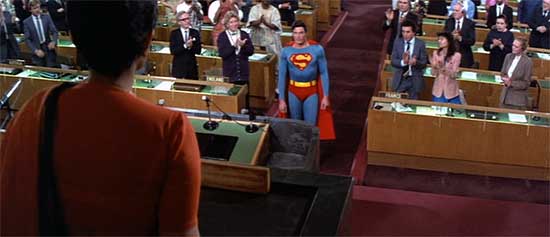
“I’ve come to a decision...”
You won’t believe that you once believed that a man could fly
It doesn’t help that the special effects suck. You get that fakey drop shadow behind Superman in flight, and he keeps having to steady his arms, as if he’s not used to flying. It’s like we’re back in the days of “Shazam!” or something. Even the opening credits look like cartoon versions of what came before. They look like placeholder credits.
Remember when we lost Brando in “II” and were stuck with Susannah York? I’d kill for her here. Instead, in the Fortress of Solitude, Kal-El gets advice from generic Kryptonian elders, heads floating in space. They come off like the League of Grumpy Old Men.
Chalk up all of this cheapness to three words: Golan and Globus. These two Israeli filmmakers, Monahem and cousin Yoram respectively, bought Cannon Films in 1979 and proceeded to make it, and themselves, synonymous with the cheapest, crappiest movies of the 1980s. They were all about quantity over quality. In 1987 alone, the year “Superman IV” was released, they produced 26 other movies, including “Over the Top” (Sylvester Stallone arm wrestles) and “Death Wish IV” (Charles Bronson kills). And that isn’t even the worst of their oeuvre. Think “Bolero,” the 1990 “Captain America,” and the “Hercules” movies with Lou Ferigno. Think “The Wicked Lady,” or “Death Wish III,” or any movie in which Marina Sirtis gets her clothes torn off. Think the worst devils of our nature.
And these are the guys who temporarily owned Superman. Oy gevalt.
The DVD commentary by screenwriter Mark Rosenthal is more dismissive of the movie than the harshest review from the most dismissive critic. It’s not a mea culpa so much as an eorum culpa. These are his first words:
You can tell from the very first credit, which says “Warner Bros.,” that something is terribly wrong in Metropolis. … When we sat and looked at these credits, which are more like graffiti on a black screen than the wonderful, and startling for their time, credits of the Dick Donner Supermans, “Superman I” and “II,” it was heartbreaking for everyone involved, who had so wanted to make this a return to the high-quality of the first two Supermans.
He talks about how, because the budget was cut in preproduction, Canon lost all the great technicians and effects people who had done the first “Superman” movies. Big scenes became small scenes. The global became local. A grand vision was replaced by the rinky-dink. It looked fake fake fake. You won’t believe that you once believed that a man could fly.
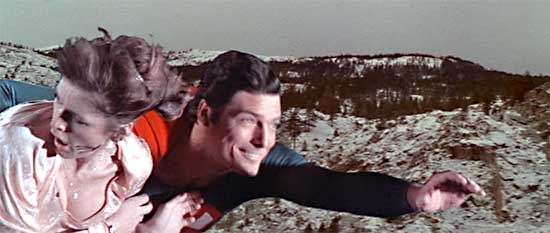
You won’t believe that you once believed that a man could fly
Lois Lane, Superman’s mother
Plus, people just got old.
Reeve still looks good as Superman (although is he wearing a wig now?), and Hackman can still play Lex Luthor. (He was a year away from another Academy Award nomination for “Mississippi Burning.”) Otherwise….
Perry White has shrunk. (Did Jackie Cooper have cancer?) Jimmy Olsen is going bald. And Lois Lane looks less like Superman’s girlfriend than Superman’s mother. Margot Kidder, bless her, didn’t age well. I assume drugs. She was 39 but looked 49.
Thus the addition of a younger love interest: Mariel Hemingway playing Lacy Warfield, daughter of David, who starts out echoing her father’s bottom line, until, influenced by Clark, on whom she has a crush, she becomes a better person. “Daddy?” she says near the end when her father is still talking circulation numbers and profits. “Stuff it!” We’re supposed to cheer.
She thinks Clark should do a regular “On the Town” feature, and takes him to aerobics class, where he fumbles about, and she takes him weight lifting, where he can’t lift anything, ha ha, and somehow she organizes a double-date for her and Clark and Lois and Superman, which Superman isn’t smart enough to get out of. “Sorry, Lois, there’s a typhoon in Taiwan.” Instead, he keeps changing from one to the other, to be with either Lacy or Lois. We’re supposed to chuckle.
Lois isn’t completely forgotten. She shows up at Clark’s place while he’s wondering what to do about nuclear disarmament, and he takes her by the hand and jumps off his terrace, which looks a lot like hers from the first film, and then, while she’s screaming, boom, he’s Superman, but with Clark’s glasses on. After that, they go flying around the country. I immediately assumed dream sequence. At one point he drops her, laughing, and she screams, but then he catches her, ha ha, before it’s too late. Surely a dream sequence. Nope. Afterward, he asks for her advice, then he kisses her to make her forget who he is again (see: “II,” Lester). How often does this happen anyway? How often does he reveal himself, fly around with her, make her fall and scream, then kiss her to make her forget it all? Brutal. No wonder she looks old.
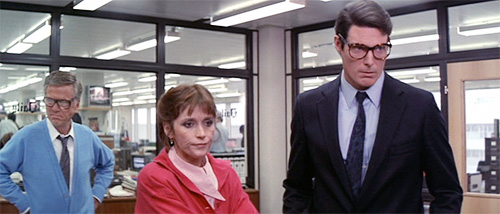
Old, old, worried
Waiting for the sun
That’s probably the biggest problem with “Superman IV.” Misplaced idealism aside, crappy special effects aside, there’s too much stupid shit.
Is Clark going to sell the farm to developers? It’s introduced in the beginning and forgotten by the end. I assume it wound up on the cutting room floor.
Nuclear Man is made from the power of the sun, which is the source of Superman’s strength. So shouldn’t contact with him, I don’t know, make Superman stronger? Instead Nuclear Man scratches his neck and Superman develops a fever. The next time we see him, he’s gray and withered, having turned old overnight. Except he’s in Smallville now. How did he get there from Metropolis? Bus? Plane? Look! In the sky! It’s … a really, really, really old and sick dude. But the green crystal at the family farm turns him back into Superman. As it always does. Me in 1987: “But didn’t he use up the last one in the last one? Or the second one?” Nope. It’s called the magic of movies.
When he returns to Metropolis, super again, he confronts Nuclear Man, who goes on a rampage. We watch 30 seconds of carnage: cars overturn, things blow up, etc. What’s Superman doing all this time? Just standing there. Because? Because the carnage. Which we have to watch. “But Superman—” Sssh. “But he wouldn’t—” Ssshhh. It’s OK.
They battle all over the world. Hey, the Great Wall of China! Hey, Nuclear Man knocks part of it down. And now Superman is putting it back together … via blue beams from his eyes? But he never—
Sssh.
When Superman figures out Nuclear Man’s vulnerability—absent the sun, he crumples like a puppet whose strings have been cut—what does he do? Lead him to the other side of the Earth, where it’s night? No, he traps him in an elevator. Which he then drags on the moon. Right! The dark side of the moon! Actually, no. In fact, a second later, the moon revolves, there’s the sun, and Nuclear Man wakes up and starts fighting again. He hammers Superman into the moon, then returns to Earth to get Lacy, for whom he has the hots. Why Lacy? Because he sees her picture in the newspaper. I mean, who’s he going to pick? Lois? She’s like 50.
Later, Superman moves the moon to cause an eclipse to cause the final death of Nuclear Man. But wouldn’t such an action screw up the tides?
Sssh.
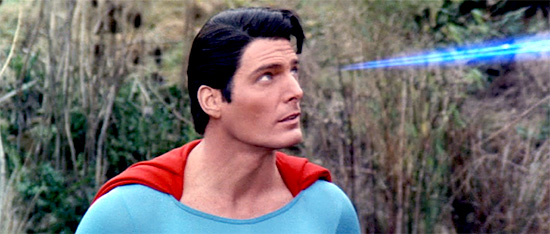
How to repair the Great Wall of China, step one
I hate the ’80s
It’s not all horrible. I like this exchange Clark has with Mr. Hornsby (Don Fellows), his real estate agent in Smallville:
Hornsby: You be careful when you get back to Metropolis, Clark. It’s a long, long way from where you were born.
Clark: Yes, sir. I never forget that, sir.
Those are nice lines and Reeve has a good line reading.
I also like the homage in the Daily Planet headline when Superman initially doesn’t respond to Jeremy:
SUPERMAN SAYS ‘DROP DEAD’ TO KID
But mostly “Superman IV” is a crime. Besides all of the above, it reminds me of everything I hated about the 1980s: aerobics, hostile takeovers, new-wave hairdos, Reaganomics. In the nukes debate, the warmongers wanted to spend trillions to increase the number of times we could destroy the planet, while the peaceniks thought getting rid of nukes meant getting rid of the knowledge of how to make nukes. If we just disarmed we’d be safe. But we’d never be safe.
Seeing the film reminds me of our cultural regression. The first movie was set among adults, in a gritty world in which journalism mattered; “IV” is set among adolescents, in a fantasy world in which only profits matter. In 1978, it felt innovative that the star lifted weights to become the central character. By ’87, we all lifted weights. There’s a body consciousness here that permeates everything. Our bodies got hard and our journalism got flabby.
I’d anticipated the first movie for months but “IV” was in theaters before I knew it was being made. I saw the first at a packed, opening-night screening in which everyone applauded, while I saw “IV” in a multiplex, the Skyway in downtown Minneapolis, which was small and nearly empty. When it was over, we shuffled out of the theater in a gloomy silence.
Mark Rosenthal:
The movie for everyone became an emblem of greed and chaos on the part of people who were in over their heads, and an unfortunate—and really almost unethical—betrayal of Chris Reeve ...
The bad guys won.
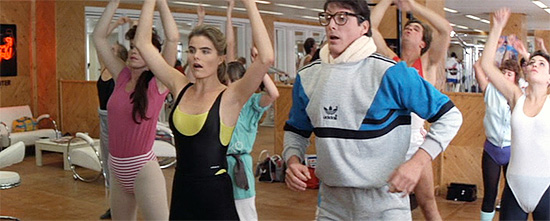
I hate the ’80s
—March 9, 2013
© 2013 Erik Lundegaard







